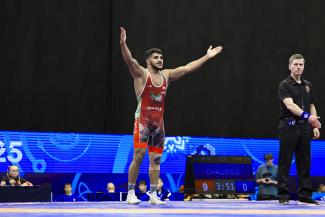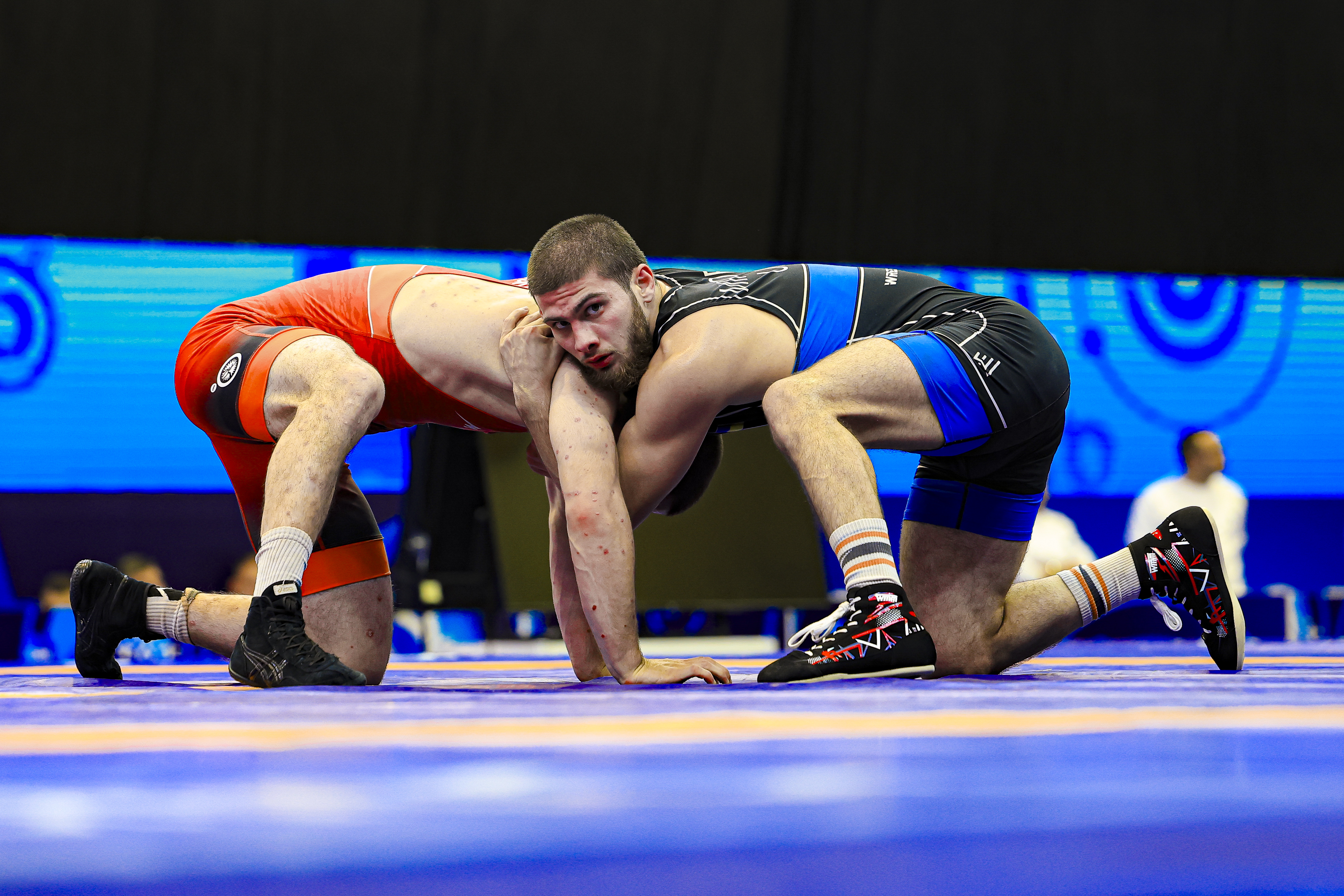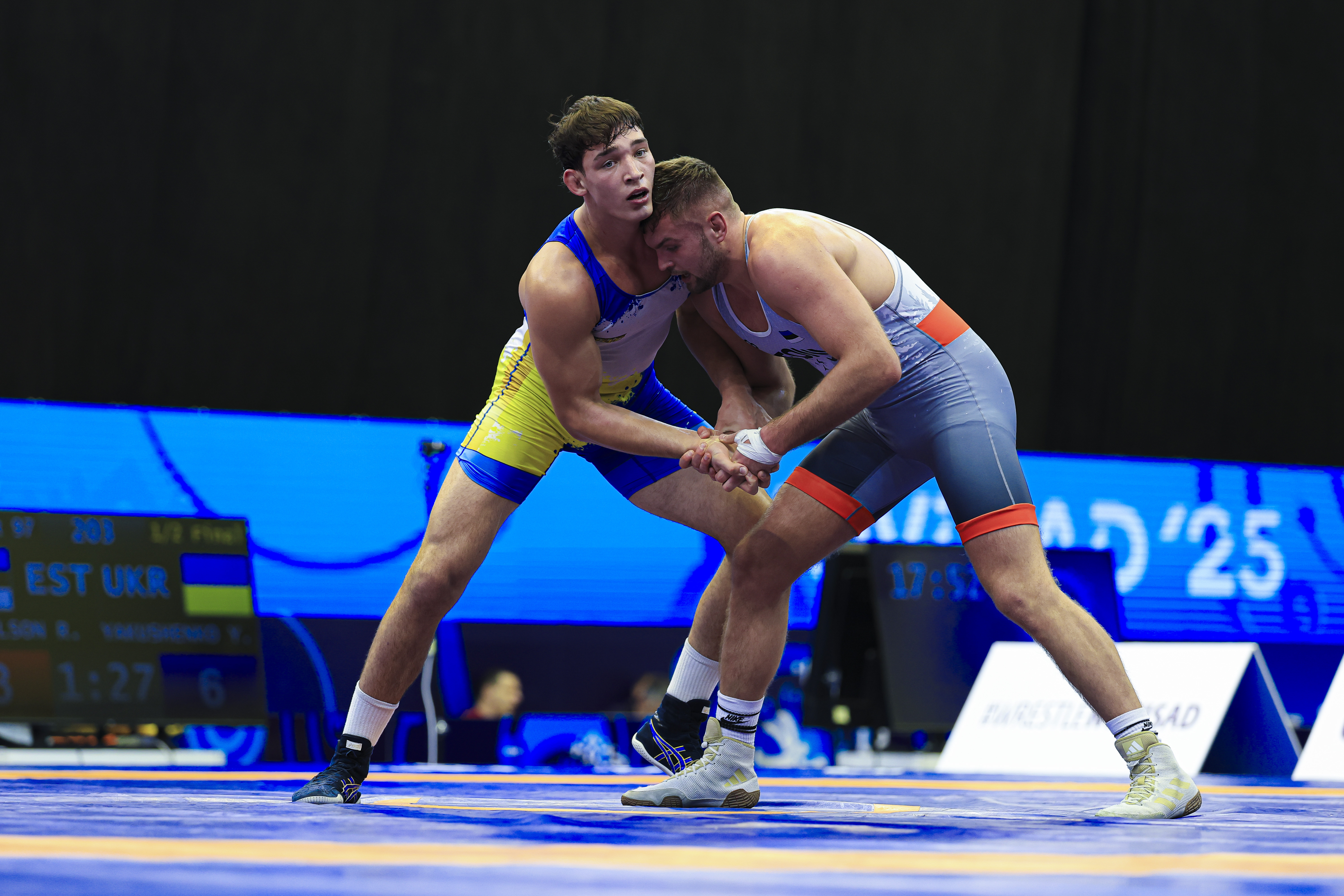Wrestling Debuts Worldwide Rankings for 2018
Thursday, February 1, 2018 - 19:27 By United World Wrestling Press

CORSIER-SUR-VEVEY (February 1) -- United World Wrestling has posted the first updates to the 2018 Ranking Series on the organization's homepage. The rankings come after an opening weekend of Greco-Roman and freestyle tournaments last week in Iran and Russia, respectively.
Winners of the Ranking Series events each received 8 points, plus an additional point for ever entry in their bracket. Placement points (plus number entries) were also awarded to the rest of the top five finishers: runner-up (6), bronze (4) and fifth place (2).
The next Ranking Series events are scheduled for mid-February with women’s wrestling opening their season at the Klippan Ladies in Sweden, while Greco-Roman wrestlers get their second event at the Cerro Pelado in Havana, Cuba.
Points will be automatically uploaded on the UWW homepage following the conclusion of all Ranking Series events, continental and world championships.
In case of a points tie between two or more athletes, the following will determine the highest ranked individual:
- Highest number of participation in the ranking events*
- Highest number of Gold Medals in the ranking events*
- Highest number of Silver Medals in the ranking events*
- Highest number of Bronze Medals in the ranking events*
- The most classification points in the ranking events*
- The most match won by superiority in the ranking events*
- The most technical points scored in the ranking events*
* Continental Championship and UWW Select Ranking Events of the concerned year.
Should top seeded athletes not participate in the Senior World Championships or Olympic Games the same criteria will be applied to determine which athletes move into the seeding for the event.
Below is a look at the points after the first competition of the 2018 Ranking Series at the Ivan Yarygin (freestyle) and Takhti Cup (Greco-Roman).

Freestyle
57kg
1. Zavur UGUEV (RUS) // 18 Points
2. Azamat TUSKAEV (RUS) // 16 Points
3. Khuresh DONDUK OOL (RUS) // 14 Points
4. Tsogbadrakh TSEVEENSUREN (MGL) // 14 Points
5. Baris KAYA (TUR) // 12 Points
6. Frank PERRELLI (USA) // 12 Points
61kg
1. Gadzhimurad RASHIDOV (RUS) // 18 Points
2. Ismail MUSUKAEV (RUS) // 16 Points
3. Aleksandr BOGOMOEV (RUS) // 14 Points
4. Tuvshintulga TUMENBILEG (MGL) // 14 Points
5. Anthony RAMOS (USA) // 12 Points
6. Abbos RAKHMONOV (UZB) // 12 Points
65kg
1. Ilias BEKBULATOV (RUS) // 18 Points
2. Akhmed CHAKAEV (RUS) // 16 Points
3. Nachyn KUULAR (RUS) // 14 Points
4. Selahattin KILICSALLAYAN (TUR) // 14 Points
5. Batmagnai BATCHULUUN (MGL) // 12 Points
6. Tsogtbaatar DAMDINBAZAR (MGL) // 12 Points
70kg
1. Magomed KURBANALIEV (RUS) // 17 Points
2. Magomedrasul GAZIMAGOMEDOV (RUS) // 15 Points
3. Andriy KVYATKOVSKYY (UKR) // 13 Points
4. Frank MOLINARO (USA) // 13 Points
5. Israil KASUMOV (RUS) // 11 Points
6. Levan KELEKHSASHVILI (GEO) // 11 Points
74kg
1. Khetik TSABOLOV (RUS) // 16 Points
2. Zaurbek SIDAKOV (RUS) // 14 Points
3. Dovletmyrat ORAZGYLYJOV (TKM) // 12 Points
4. Kakhaber KHUBEZHTY (RUS) // 12 Points
5. Mandakhnaran GANZORIG (MGL) // 10 Points
6. Muhammet DEMIR (TUR) // 10 Points
79kg
1. Akhmed GADZHIMAGOMEDOV (RUS) // 15 Points
2. Kyle DAKE (USA) // 13 Points
3. Radik VALIEV (RUS) // 11 Points
4. Alan ZASEEV (RUS) // 11 Points
5. Rashid KURBANOV (UZB) // 9 Points
6. Muhammet KUTANOGLU (TUR) // 9 Points
86kg
1. David TAYLOR III (USA) // 20 Points
2. Fatih ERDIN (TUR) // 18 Points
3. Vladislav VALIEV (RUS) // 16 Points
4. Artur NAIFONOV (RUS) // 16 Points
5. Yurieski TORREBLANCA QUERALTA (CUB) // 14 Points
6. Zaur BERADZE (GEO) // 14 Points
92kg
1. Abdulrashid SADULAEV (RUS) // 15 Points
2. Anzor URISHEV (RUS) // 13 Points
3. Yury BELONOVSKIY (RUS) // 11 Points
4. Turtogtokh LUVSANDORJ (MGL) // 11 Points
5. Serda BOKE (TUR) // 9 Points
6. Nicholas HEFLIN (USA) // 9 Points
97kg
1. Kyle SNYDER (USA) // 17 Points
2. Rasul MAGOMEDOV (RUS) // 15 Points
3. Magomed IBRAGIMOV (UZB) // 13 Points
4. Vladislav BAITCAEV (RUS) // 13 Points
5. Yunus DEDE (TUR) // 11 Points
6. Batzul ULZIISAIKHAN (MGL) // 11 Points
125kg
1. Muradin KUSHKHOV (RUS) // 18 Points
2. Anzor KHIZRIEV (RUS) // 16 Points
3. Nicholas GWIAZDOWSKI (USA) // 14 Points
4. Zolboo NATSAGSUREN (MGL) // 14 Points
5. Zachery William REY (USA) // 12 Points
6. Lkhagvagerel MUNKHTUR (MGL) // 12 Points

Greco-Roman
55kg
1. Ekrem OZTURK (TUR) // 14 Points
2. Bachana PUTKARADZE (GEO) // 12 Points
3. Moslem NADERIKHADEM (IRI) // 10 Points
4. Reza KHEDRI (IRI) // 10 Points
5. Ziyad ZEYNALOV (AZE) // 8 Points
6. Ibrahim NURULLAYEV (AZE) // 8 Points
60kg
1. K. ZHOLCHUBEKOV (KGZ) // 17 Points
2. Mehrdad MARDANI (IRI) // 15 Points
3. Dastan ZARLYKHANOV (KAZ) // 13 Points
4. Mirambek AINAGULOV (KAZ) // 13 Points
5. Sakit GULIYEV (AZE) // 11 Points
6. R. TEIISHOV (KGZ) // 11 Points
63kg
1. K. SULAYMANOV (KGZ) // 15 Points
2. Kudaibergen TURSYNOV (KAZ) // 13 Points
3. Mohammad NOURBAKHSH (IRI) // 11 Points
4. U. AMATOV (KGZ) // 11 Points
5. Khvicha TCHITAVA (GEO) // 9 Points
6. Dmytro KOSENOK (UKR) // 9 Points
67kg
1. Almat KEBISPAYEV (KAZ) // 18 Points
2. Fevzi MAMUTOV (UKR) // 16 Points
3. Atakan YUKSEL (TUR) // 14 Points
4. Mohammad ELYASI (IRI) // 14 Points
5. Ismael BORRERO (CUB) // 12 Points
6. Murat FIRAT (TUR) // 12 Points
72kg
1. Demeu ZHADRAYEV (KAZ) // 16 Points
2. Murat DAG (TUR) // 14 Points
3. Ibragim MAGOMADOV (KAZ) // 12 Points
4. Farshad BELFAKEH (IRI) // 12 Points
5. Goga GOGIBERASHVILI (GEO) // 10 Points
6. Afshin BYABANGARD (IRI) // 10 Points
77kg
1. Mohammadali GERAEI (IRI) // 16 Points
2. Serkan AKKOYUN (TUR) // 14 Points
3. Fatih CENGIZ (TUR) // 12 Points
4. Boroomand GHAREHDAGHI (IRI) // 12 Points
5. Bakuri GOGOLI (GEO) // 10 Points
6. Pejman POSHTAM (IRI) // 10 Points
82kg
1. Emrah KUS (TUR) // 17 Points
2. Daniel ALEKSANDROV (BUL) // 15 Points
3. Burhan AKBUDAK (TUR) // 13 Points
4. Aivengo RIKADZE (GEO) // 13 Points
5. Keivan DALINI (IRI) // 11 Points
6. Yaroslav FLICHAKOV (UKR) // 11 Points
87kg
1. Saman AZIZI (IRI) // 15 Points
2. Khussein MUTSOLGOV (KAZ) // 13 Points
3. Tarek ABDELSLAM (BUL) // 11 Points
4. Azamat KUSTUBAYEV (KAZ) // 11 Points
5. S. SHIRDAKOV (KGZ) // 9 Points
6. Giorgi KATSANASHVILI (GEO) // 9 Points
97kg
1. Orkhan NURIYEV (AZE) // 17 Points
2. Cenk ILDEM (TUR) // 15 Points
3. Ali HEIDARI (IRI) // 13 Points
4. Turman EYYUBOV (AZE) // 13 Points
5. Mohammad YEGANEH (IRI) // 11 Points
6. Dorin PIRVAN (ROU) // 11 Points
130kg
1. Behnam ARPATAPEH (IRI) // 12 Points
2. Osman YILDIRIM (TUR) // 10 Points
3. Shahab GHOUREHJILI (IRI) // 8 Points
4. Ciurariu ALEXUC (ROU) // 7 Points
5. Abolfazl NAJAFI (IRI) // 6 Points
6. Anton SAVENKO (KAZ) // 5 Points


 Irfan MIRZOIEV (UKR) holds off Temuri ORJONIKIDZE (GEO) in the 77kg final. (Photo: United World Wrestling / Amirreza Aliasgari)
Irfan MIRZOIEV (UKR) holds off Temuri ORJONIKIDZE (GEO) in the 77kg final. (Photo: United World Wrestling / Amirreza Aliasgari) Yehor YAKUSHENKO (UKR) defeated Richard KARELSON (EST) in the 97kg semifinal. (Photo: United World Wrestling / Kadir Caliskan)
Yehor YAKUSHENKO (UKR) defeated Richard KARELSON (EST) in the 97kg semifinal. (Photo: United World Wrestling / Kadir Caliskan)
Share your thoughts.
Comments